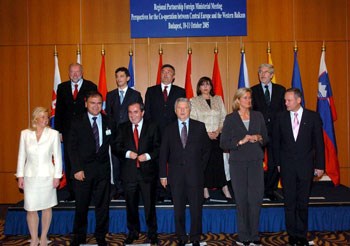- Published: 11.10.2005.
Minister Kolinda Grabar-Kitarović took part at the meeting of the foreign ministers of the Regional Partnership and the Western Balkans
Minister of Foreign Affairs and European Integration Kolinda Grabar-Kitarović took part today, 11 October 2005 in Budapest, at the meeting of the foreign ministers of the Regional Partnership and the Western Balkans
The meeting discussed the perspectives of co-operation between Central and South Eastern Europe and also saw the foreign ministers of Albania, Bosnia and Herzegovina, Macedonia, and Serbia and Montenegro.
J O I N T STATEMENT
adopted by the meeting of the Foreign Ministers of the Regional Partnership and the Western Balkans on „Perspective of co-operation between Central Europe and
the Western Balkans”
Budapest, 11 October 2005
The Foreign Ministers of the Regional Partnership (Austria, Czech Republic, Hungary, Poland, Slovakia and Slovenia) and the countries of the Western Balkans (Albania, Bosnia and Herzegovina, Croatia, Macedonia and Serbia and Montenegro) met in Budapest on 11 October 2005 to discuss the possibilities of further deepening relations between the participating countries.
The countries of the Regional Partnership expressed their conviction that the stability and development of the Western Balkan region is of common interest for the whole of Europe and reiterated their commitment to the European integration of the Western Balkan region.
The Foreign Ministers stressed that the EU’s Thessaloniki Agenda confirming the European perspective of the countries of the Western Balkans is an incentive of crucial importance for the continuation of reforms in the region. In this spirit, the countries of the Regional Partnership continue to be ready to provide assistance to the preparation of the countries of the Western Balkans for integration. In view of important decisions to be taken in the first half of 2006, the Foreign Ministers welcomed the willingness of Austria to make the Western Balkans one of the priorities of her forthcoming EU Presidency.
Being aware of the specific problems of the region that remain to be solved, the countries of the Regional Partnership wish to contribute to shaping the policy of the European Union regarding this region. The participants of the meeting pointed out that the criteria of integration apply in the same manner to all countries of the region, on the basis of individual performance. In this context, acknowledging the progress made so far, they also highlighted that full co-operation with ICTY remains of great significance.
The participants emphasized that in order to complete the reforms serving the advancement of integration it is of utmost importance to establish and maintain full social consensus and further develop regional co-operation. In this light, they stressed the significance of the various bi- and multilateral initiatives (among others the Szeged Process, the Bratislava Process and the Stability Pact for South Eastern Europe and the Center for EU Integration Support) aiming at the earliest possible fulfilment of the above goals.
The Foreign Ministers welcomed the achievements made by the countries of the region to date. They welcomed the historic decisions of the Council of the European Union of the 3 of October regarding Croatia and Serbia and Montenegro. The opening of accession negotiations with Croatia sends an encouraging message to the whole region. At the same time the opening of Stabilization and Association Agreement negotiations with Serbia and Montenegro is a particularly positive development.
They noted the recent progress in Macedonia and expressed expectation that a discussion will be opened on giving the country a candidate status in case the assessment of the European Commission and its recommendations are positive.
They are looking forward to the expected completion of negotiations on the Stabilization and Association Agreement with Albania. They expressed their hope that Bosnia and Herzegovina will meet all the criteria set by the Feasibility Study, in particular in the area of police reform, for the opening of negotiations on the Stabilization and Association Agreement, and they welcomed in particular the recent developments in the area of police reform.
The countries of the Regional Partnership can assist the countries of the Western Balkans mainly by sharing with them the experience gathered in the process of economic and social transformation and European integration. The participating Foreign Ministers identified six specific fields of co-operation, with respective joint initiatives to be co-ordinated by one of the Regional Partnership countries with the participation of all interested partner countries, as follows:
a) Preparation for the regulatory system of the internal market (focusing on standardization, consumer and health protection, system of quality certification, reciprocal recognition of diplomas, harmonization of education and vocational training). – Czech Republic b) Environmental protection (focusing on waste management, sewage cleaning and sanitation, quality of drinking water, air pollution.). – Austria c) Co-operation in justice and home affairs (focusing on border protection and visa policies, migration, fight against organized crime and police co-operation, judicial co-operation on civil and criminal law matters). – Hungary d) Assistance and share of experience with a view to effective use of EU-assistance. – Poland e) Veterinary and phytosanitary matters, legal regulation of food safety. – Slovenia f) Fostering of community relations (focusing on strengthening the European orientation, enhancing civil society). – Slovakia
Such initiatives shall include i. a.:
• Facilitating the access to information on the needs of the Western Balkans,
• Assistance in the networking between the potential recipients and providers of know-how in the abovementioned fields of co-operation,
• Activities at EU-level in Brussels/Strasbourg with a view to achieving a more efficient use of the financial and human resources that the countries concerned have already dedicated to the respective field of action.
The Ministers agreed to review, in the present format and on an annual basis, the current state of co-operation between the two groups of countries and the activities of the expert working groups established on the above matters.



